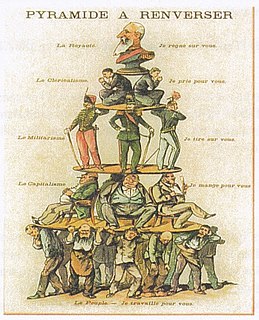Related Research Articles
Behavior or behaviour is the range of actions and mannerisms made by individuals, organisms, systems or artificial entities in some environment. These systems can include other systems or organisms as well as the inanimate physical environment. It is the computed response of the system or organism to various stimuli or inputs, whether internal or external, conscious or subconscious, overt or covert, and voluntary or involuntary.

Social science is one of the branches of science, devoted to the study of societies and the relationships among individuals within those societies. The term was formerly used to refer to the field of sociology, the original "science of society", established in the 19th century. In addition to sociology, it now encompasses a wide array of academic disciplines, including anthropology, archaeology, economics, human geography, linguistics, management science, communication science, political science and psychology.

The following outline is provided as an overview of and topical guide to the discipline of sociology:

In philosophy, systems theory, science, and art, emergence occurs when an entity is observed to have properties its parts do not have on their own, properties or behaviors that emerge only when the parts interact in a wider whole.
Sociotechnical systems (STS) in organizational development is an approach to complex organizational work design that recognizes the interaction between people and technology in workplaces. The term also refer to coherent systems of human relations, technical objects, and cybernetic processes that inhere to large, complex infrastructures. Social society, and its constituent substructures, qualify as complex sociotechnical systems.
In science and engineering, root cause analysis (RCA) is a method of problem solving used for identifying the root causes of faults or problems. It is widely used in IT operations, manufacturing, telecommunications, industrial process control, accident analysis, medicine, healthcare industry, etc. Root cause analysis is a form of deductive inference since it requires an understanding of the underlying causal mechanisms of the potential root causes and the problem.

Structural functionalism, or simply functionalism, is "a framework for building theory that sees society as a complex system whose parts work together to promote solidarity and stability".

In the social sciences, social structure is the patterned social arrangements in society that are both emergent from and determinant of the actions of individuals. Likewise, society is believed to be grouped into structurally related groups or sets of roles, with different functions, meanings, or purposes. Examples of social structure include family, religion, law, economy, and class. It contrasts with "social system", which refers to the parent structure in which these various structures are embedded. Thus, social structures significantly influence larger systems, such as economic systems, legal systems, political systems, cultural systems, etc. Social structure can also be said to be the framework upon which a society is established. It determines the norms and patterns of relations between the various institutions of the society.

Environmental psychology is a branch of psychology that explores the relationship between humans and the external world. It examines the way in which the natural environment and our built environments shape us as individuals. Environmental Psychology emphasizes how humans change the environment and how the environment changes humans' experiences and behaviors. The field defines the term environment broadly, encompassing natural environments, social settings, built environments, learning environments, and informational environments. According to an article on APA Psychnet, environmental psychology is when a person thinks of a plan, travels to a certain place, and follows through with the plan throughout their behavior.
Social marketing has the primary goal of achieving "common good". Traditional commercial marketing aims are primarily financial, though they can have positive social effects as well. In the context of public health, social marketing would promote general health, raise awareness and induce changes in behaviour. Social marketing has been a large industry for some time in 2021 and was originally done with newspapers and billboards, but similar to commercial marketing has adapted to the modern world. The most common use of social marketing in today's society is through social media. However, to see social marketing as only the use of standard commercial marketing practices to achieve non-commercial goals is an oversimplified view.
Corporate behaviour is the actions of a company or group who are acting as a single body. It defines the company's ethical strategies and describes the image of the company.

Right realism, in criminology, also known as New Right Realism, Neo-Classicism, Neo-Positivism, or Neo-Conservatism, is the ideological polar opposite of left realism. It considers the phenomenon of crime from the perspective of political conservatism and asserts that it takes a more realistic view of the causes of crime and deviance, and identifies the best mechanisms for its control. Unlike the other schools of criminology, there is less emphasis on developing theories of causality in relation to crime and deviance. The school employs a rationalist, direct and scientific approach to policy-making for the prevention and control of crime. Some politicians who ascribe to the perspective may address aspects of crime policy in ideological terms by referring to freedom, justice, and responsibility. For example, they may be asserting that individual freedom should only be limited by a duty not to use force against others. This, however, does not reflect the genuine quality in the theoretical and academic work and the real contribution made to the nature of criminal behaviour by criminologists of the school.

Sociology is a social science that focuses on society, human social behavior, patterns of social relationships, social interaction, and aspects of culture associated with everyday life. It uses various methods of empirical investigation and critical analysis to develop a body of knowledge about social order and social change. While some sociologists conduct research that may be applied directly to social policy and welfare, others focus primarily on refining the theoretical understanding of social processes and phenomenological method. Subject matter can range from micro-level analyses of society to macro-level analyses.

Social and behavior change communication (SBCC), often also only "BCC" or "Communication for Development (C4D)" is an interactive process of any intervention with individuals, group or community to develop communication strategies to promote positive behaviors which are appropriate to their settings and thereby solving the world's most pressing health problems. This in turn provides a supportive environment which will enable people to initiate, sustain and maintain positive and desirable behavior outcomes.
The environmental sustainability problem has proven difficult to solve. The modern environmental movement has attempted to solve the problem in a large variety of ways. But little progress has been made, as shown by severe ecological footprint overshoot and lack of sufficient progress on the climate change problem. Something within the human system is preventing change to a sustainable mode of behavior. That system trait is systemic change resistance. Change resistance is also known as organizational resistance, barriers to change, or policy resistance.
The social sciences are the sciences concerned with societies, human behaviour, and social relationships.

This bibliography of Sociology is a list of works, organized by subdiscipline, on the subject of sociology. Some of the works are selected from general anthologies of sociology, while other works are selected because they are notable enough to be mentioned in a general history of sociology or one of its subdisciplines.

Behavioural design is a sub-category of design, which is concerned with how design can shape, or be used to influence human behaviour. All approaches of design for behaviour change acknowledge that artifacts have an important influence on human behaviour and/or behavioural decisions. They strongly draw on theories of behavioural change, including the division into personal, behavioural, and environmental characteristics as drivers for behaviour change. Areas in which design for behaviour change has been most commonly applied include health and wellbeing, sustainability, safety and social context, as well as crime prevention.
Pro-environmental behaviour is behaviour that a person consciously chooses in order to minimize the negative impact of their actions on the environment. Barriers to pro-environmental behaviour are the numerous factors that hinder individuals when they try to adjust their behaviours toward living more sustainable lifestyles. Generally, these barriers can be separated into larger categories: psychological, social/cultural, financial and structural. Psychological barriers are considered internal, where an individuals' knowledge, beliefs and thoughts affect their behaviour. Social and cultural barriers are contextual, where an individual's behaviour is affected by their surroundings. Financial barriers are simply a lack of funds to move toward more sustainable behaviour. Structural barriers are external and often impossible for an individual to control, such as lack of governmental action, or locality of residence that promotes car use as opposed to public transit.
A Behavioral Change Support System (BCSS) is any information and communications technology (ICT) tool, web platform, or gamified environment which targets behavioral changes in its end-users. BCSS are built upon persuasive systems design techniques.
References
- ↑ McComas, Katherine (11 February 2017). "When even the 'best-laid' plans go wrong". EMBO Reports. 5 (Suppl 1): S61–S65. doi:10.1038/sj.embor.7400257. ISSN 1469-221X. PMC 1299213 . PMID 15459738.
- ↑ Natori, Yoji (1998). Local-level Nature Conservation Planning for Biodiversity in Japan: A Case Study of Nakago Village, Niigata. University of Wisconsin--Madison. Retrieved 11 February 2017.
- ↑ Dalela, Ashish (December 2008). Vedic Creationism: Vedic Theories of Creation and Their Relation to Science. iUniverse. ISBN 9780595525737 . Retrieved 11 February 2017.
- ↑ Jachowski, David S.; Millspaugh, Joshua J.; Angermeier, Paul L.; Slotow, Rob (13 September 2016). Reintroduction of Fish and Wildlife Populations. Univ of California Press. ISBN 9780520284616 . Retrieved 11 February 2017.
- ↑ Norton, Bryan G. (16 December 2015). Sustainable Values, Sustainable Change: A Guide to Environmental Decision Making. University of Chicago Press. ISBN 9780226197593 . Retrieved 11 February 2017.